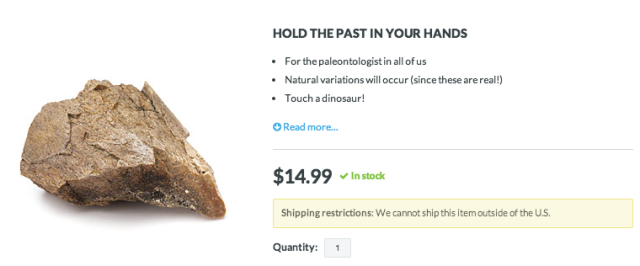ThinkGeek Is Selling Dinosaur Bone Fragments and the Vertebrate Paleontology Community Is Maaaaad
Because capitalism and dinosaurs go great together!


If you’ve ever wanted to own your very own piece of a dinosaur bone, then ThinkGeek has just the product for you! You know—if you also want a whole bunch of dinosaur bone specialists to be very upset with you, that is. Apparently buying these kinds of bone fragments is a double-plus-ungood, and ThinkGeek’s now facing heat from the scientific community for making them available for purchase.
On the ThinkGeek website, the product is billed as part of a “genuine, fossilized dinosaur bone” from the body of a hadrosaurid, which is a classification of duck-billed dinosaurs—basically, the Bigmouths from The Land Before Time. However, there’s one big problem: vertebrate fossils are illegal to collect on federal and state land, and many vertebrate fossils you find for sale in the commercial market have basically been poached. According to the Society of Vertebrate Paleontology, “The barter, sale, or purchase of scientifically significant vertebrate fossils is not condoned, unless it brings them into or keeps them within a public trust.”
ThinkGeek’s advertising copy maintains that the bone fragments are from “privately leased land” somewhere in the United State, but that hasn’t stopped many within the paleontology community from objecting to the sale of these fossils, claiming such bones are an invaluable and very limited resource for research.
“Private land or no, fossils are not a mere collectable or a stuffed toy,” a commenter named Lisa Buckley told the site. “They are an irreplaceable, non-renewable part of the history of the entire planet. Fossils are the only words surviving from the history book of our planet, and each fossil that is sold and ends up in private hands (not accessible to science) is another word erased from our unique story.”
To address the community’s concerns, ThinkGeek put out this statement in their comments section yesterday morning:
The Hadrosaurid bones that we carry have been verified as ethically and legally sourced from private land in Montana. The specimens themselves were found out of situ and therefore have been so weathered that there is little, if any, scientific data that can be gathered from the pieces. We believe that putting these pieces in the hands of people who previously could only see actual dinosaur bones in museums won’t curb science, but will instead open up a fascinating world to a new generation of young paleontologists.
For many critics, however, this statement isn’t enough, and in their eyes the website is still promoting the commercial sale of a dubiously-obtained resource which would be better off in the hands of capable research scientists — “the paleontologic equivalent of ‘Don’t worry, these cigars are totally from Cuba,'” as one commenter puts it.
But what if you really really want? Most scientists recommend fossil replica services that work with scientists to painstakingly recreate recently discovered samples, such as Gaston Design. Sure, you can’t clone your own hadrosaurid from such a fragment, but we’ve all seen Jurassic Park—that’s probably a good thing, right?
(h/t to Edward Bryd Davis on Twitter)
Previously in Dinosaurs
- Say Hello to Deinocheirus Mirificus, AKA the Weirdest Dinosaur Ever Discovered
- New Study Closes the Evolutionary Gap Between Dinosaurs and Birds
- The Amazing Scientific Achievements of the Woman Who Kickstarted Paleontology
Are you following The Mary Sue on Twitter, Facebook, Tumblr, Pinterest, & Google +?
Have a tip we should know? [email protected]